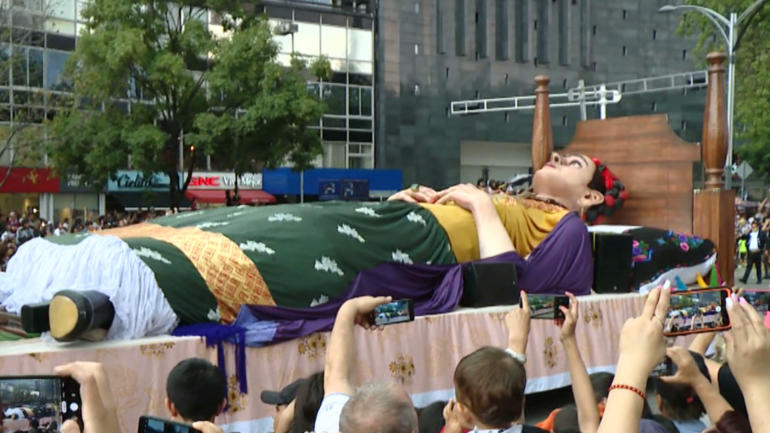November 2 is Day of the Dead in Mexico, and hundreds of thousands of people are spending the day in cemeteries. Mexicans take food and drinks and pass the time with their dearly departed. It’s a centuries, old tradition that still has relevance today.
CGTN’s Franc Contreras reports.
Day of the Dead. It’s a two-day ritual, November 1 and 2 when Mexicans celebrate the lives of dead family members and dear friends.
The country takes on a festive atmosphere. Local markets like Toluca are filled with people buying items they will place on special altars, called offrendas for the dead.
Most are handmade. Little skulls made of chocolate and sugar, cut crepe paper decorations and cookie coffins. Maria Cristina Hernandez says it’s a mixture of commerce and tradition.
“It is important to preserve our traditions, which our ancestors have ingrained in us, said Hernandez. It is also something that gives many families who are dedicated to sales in this season income so we can eat.”
This year, large parades were held in Mexico City to honor the dead. People from many nations participated.
It’s a special holiday, when famous and anonymous Mexicans who have left this life are venerated.
Large scale public spectacles are just the latest edition to a long history of celebrations in the Mexican capital when it comes to Day of the Dead.
In Mexico City’s main plaza, the Zocalo, the world’s largest altar is open to the public.
Mexican President Andres Manuel Lopez Obrador came out for the inauguration.
Day of the Dead culture is proudly on display, especially here at the Museum of Popular Cultures.
Hand-painted miniature figures are for sale. A mother, doctor, and baby at childbirth, a dead dentist, and a figure of a journalist reminds people that Mexico is one of the deadliest countries for working reporters.
At the Zapata Vive coffee shop in Mexico City, an ofrenda has been built here to honor social activists, who were murdered.
Samir Flores Soberanes was an indigenous environmentalist, assassinated in February. Student Carlos Sinué Cuevas Mejía killed in 2011. And Jyri Jaakkola, a human rights activist from Finland murdered in Oaxaca state a year earlier.
Anthropologist Martha Turok says anywhere else in the world, violent deaths like this would leave people feeling only pain. But not in Mexico.
“What is different in Mexico and different among the indigenous groups is the belief that they come back,” said Turok. “And they come back and that there is a receiving of the souls and spending time with the souls and giving them food and drink. When somebody dies, yes there is a period of mourning. It is a loss. It’s what happens afterward, the fact that you know they are going to come back that makes it livable.”
This is the essence of what this traditional celebration offers Mexicans and the rest of the world, a brief opportunity to reunite, with loved ones, who are no longer among the living.
 CGTN America
CGTN America

